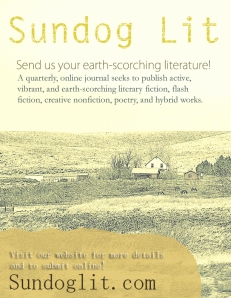The Chicago Reader, Chicago’s largest free weekly newspaper and a nationally recognized leader in the alternative press, is now accepting submissions for its 13th annual Pure Fiction issue—a collection of short stories by local fiction writers paired with illustrations by local artists.
Please send your fiction of up to 3,000 words to fiction@chicagoreader.com by November 1st, 2012. Featherproof Books‘ Zach Dodson will be the guest curator for this coming Pure Fiction issue, and those published will be paid for their work. Please see the Submissions Page for complete details.
***
 Sundog Lit is a new, independent, online literary magazine and is seeking submissions for their first issue. They also accept and read submissions year-round. Sundog Lit is committed to publishing dynamic, vibrant, earth-scorching literature by emerging and established writers. They publish flash fiction, short stories, creative nonfiction (personal, lyric, segmented, and hybrid essays), and poetry.
Sundog Lit is a new, independent, online literary magazine and is seeking submissions for their first issue. They also accept and read submissions year-round. Sundog Lit is committed to publishing dynamic, vibrant, earth-scorching literature by emerging and established writers. They publish flash fiction, short stories, creative nonfiction (personal, lyric, segmented, and hybrid essays), and poetry.
Please visit SundogLit.com to check out the site and to read the complete submissions guidelines. Stay tuned for periodic prompts, weekly content, and new features.
***
The Department of Comparative Literature at the University of Michigan has issued a call for papers for Comparative Literature Intra-Student Faculty Forum (CLIFF) a graduate student conference. The conference, titled “X is Political” will be held on Thursday, March 28th and Friday, March 29th 2013 at the University of Michigan in Ann Arbor. There will be a Keynote Address by Professor Chantal Mouffe of University of Westminster .
CLIFF describes the topic of their conference as follows:
X Is Political. For X, read elections, race, class, gender, identity, economics, war, the body, the personal, sex, clothes, teaching, food, culture, nature, the exhibition you saw yesterday and this CFP you are reading today. Stop looking, there’s no way out: everything is political.
The by-now well established habit in academic and activist circles of expanding the political to include just about anything has been productive and most often emancipatory, enabling us to consider articulations of difference as grounds for struggle and self-assertion rather than abnormality. Still, critical space must be made to pause and reflect on where that politicizing impetus comes from, who it benefits at whose expense, what problems it solves, and what problems it creates.
As literary and cultural critics, we wish to consider “X Is Political” itself as a political statement that does not only describe, but also does things. What do we mean when we say that X is political? What are we trying to achieve? Are we reclaiming control over X? Are we trying to dignify X? Do we risk turning the
political into a potentially normative and narrowing framework? Can it be emancipatory to deny that X is political? What becomes of X when it is made political? What becomes of politics when it encounters X?Since the political as a category is extended to everything, papers might engage with these questions from any number of frameworks, including but not limited to: literature, race studies, gender and sexuality, social sciences, political science, post-colonial studies, law, philosophy, history. This list is meant to
inspire engaging work, rather than exhausting all possible topics.
Paper proposals of at least 1,000 words should be sent by November 30th, 2012 to cliffconference2013@gmail.com. Presenters will be notified by January 15, 2013.